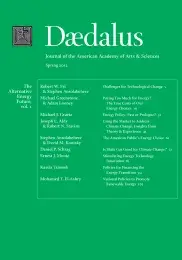Energy Policy: Past or Prologue?
The United States was remarkably complacent about energy policy until the Arab oil embargo of 1973. Since then, we have relied on unnecessarily costly regulations and poorly designed subsidies to mandate or encourage particular forms of energy production and use. Our presidents have quested after an elusive technological “silver bullet.” Congress has elevated parochial interests and short-term political advantages over national needs. Despite the thousands of pages of energy legislation enacted over the past four decades, Congress has never demanded that Americans pay a price that reflects the full costs of the energy they consume. Given our nation’s economic fragility, our difficult fiscal situation, and the daunting challenges of achieving energy security and limiting climate change, we can no longer afford second- and third-best policies. This essay discusses the failures of the past and how we might avoid repeating them.
We take it for granted that when we come home at night and flip on the light switch, the bulb will illuminate. We also expect the heat to come on when we turn up the thermostat. Although we sometimes flinch at the price, we assume that when we pull up to one of the more than one hundred thousand gas stations in the United States, the fuel will flow from below the asphalt into our cars’ gas tanks.
For most of our nation’s history, we were able to garner all the energy we used from our own lands: first, wood, then coal and oil. From the end of World War II through the late 1960s, the United States not only produced the bulk of oil consumed domestically, but also served as emergency supplier to the rest of the free world. Large U.S. and British oil companies controlled vast oil reserves in the Middle East. Before the 1970s, our nation’s policy struggles over oil had mostly dealt with how to respond to abundance.
We remained remarkably complacent about energy policy until the Arab oil embargo in October 1973 surprised our political leaders and stunned the American public. Complacency had taken hold largely because oil prices had been remarkably stable, or even declining, for decades. Oil had been plentiful and cheap. Inflation in energy products had been lower than inflation generally.
. . .
